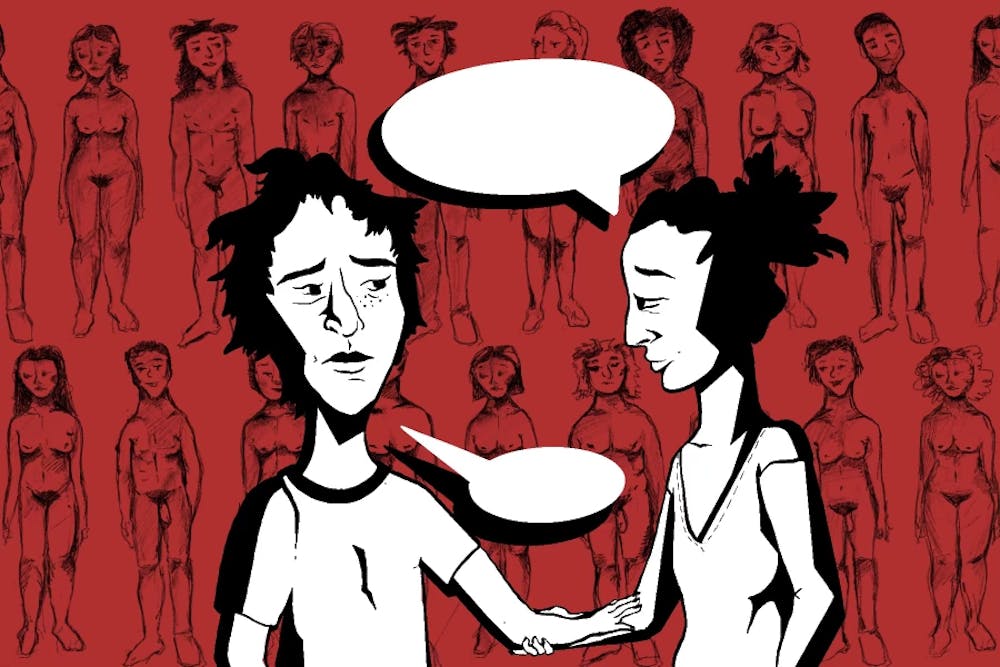Editor's note: The Front has issued a statment on this guest column, which can be accessed here.
Content Warning: This guest submission contains language that may be triggering or traumatizing to some readers.
Many enjoy the liberal echo chamber in Bellingham. Our motto is practically, “If you don’t have something progressive to say, don’t say anything at all.” But never being challenged means we may not critically think about what our peers are doing, or feel hesitant about disagreeing with a fellow social warrior in fear of being seen as the opposition. This lack of a true sounding board causes a groupthink effect that breeds harmful beliefs under the guise of being liberal.
One such belief is the idea that sexual assault is only committed by bad people who should be exiled. There are definitely many assaulters who deserve this punishment, but we need to recognize that sexual assault is broader than malicious acts from unsavable people. I want to bring to light the cases of sexual assault that victims or witnesses feel they can’t bring up. Like when a good friend tries to get with someone who was a little too high. Or when you feel like refusing consent isn’t going to be received well, so you just accept the situation. Or when that person ‘consented’ to sex while blackout drunk. Or when your partner, who you are in love with and want to stay with, convinces you to have sex when you don’t want to.
It’s natural to want to assume you don’t know the whole story or justify actions as ‘mistakes’ or even ‘lies.’ We want to forget that stuff happened because we think if we believe this person did a terrible thing, it means they’re a terrible person. I want to talk about those daily moral dilemmas many decide to not deal with yet. The belief that all people who commit sexual assault are irredeemable can deceive us into ignoring bad behavior instead of attempting to educate ignorant people.
Here is a way to deal with what has always been swept under the rug:
The first step is to accept that sexual assault can be committed by people who mean well. Once we normalize this belief it will be easier for both victims and witnesses to recognize and acknowledge assaults from their loved ones and friends. Moreover, it will be easier for perpetrators to accept responsibility and learn from their mistakes. Realizing that sexual assault may come from people you still want to maintain a relationship with will help you recognize when something wrong is happening. If that's the case, you don’t have to justify their behavior. You can confront them and, if they’re worth keeping around, they’ll take responsibility for what happened and learn to do better.
The next thing to do is agree that the scope of sexual assault is incredibly wide and that every instance is a relevant experience that should be brought up. This scope includes mistakes made by well-intentioned people, or even progressive allies, as well as people who have bad intentions.
The U.S. Department of Health & Human Services defines sexual assault as “any type of sexual activity or contact that you do not consent to.” This includes: when you’re flirting with someone so they don’t think they need to ask for consent, when someone touches you after you’ve had six drinks because you told them you wanted to hook up a few days ago and when you don’t feel like you can take your consent back halfway through. Any time you feel uncomfortable about how you are being touched, you should feel valid in saying something. However, since sexual assault encompasses so many things, there can’t be one right response to an accusation.
The last step is realizing that there could be more than one right way to respond to an assault. Progressive people rightfully take sexual assault seriously, but this often leads to the belief that the correct reaction to every assault is to stop being the perpetrator’s friend and tell others to steer clear. This creates two issues.
First, if the assaulter is shunned when they had good intentions, what will they do next? They may realize what they’ve done is wrong and learn their lesson, or, more likely, they could angrily find new friends and continue to act the same way.
Second, holding the belief that this is the only right thing to do creates a false dichotomy: either you do the right thing and exile the perpetrator, or you do the wrong thing and ignore the issue. The former is so severe that many just decide to live with their decision to do the latter, but the truth is, depending on the situation, ostracizing the assaulter may not be the only morally sound way to respond to a sexual assault.
When someone you know commits sexual assault, it can be hard to decide how to react if you believe they’re a good person. Realizing that sexual assault can come from people who do genuinely try to be good can help you look at the situation in a potentially constructive way. If you believe your friend could have been ignorant of their actions, talk to them about it. Tell them what they have done, and encourage them to take responsibility and put time into educating themselves so they know how to act in the future. Remember that regardless of intent, any sexual assault is an act that causes harm. A part of taking responsibility for what you have done is accepting any punishment that comes because of it. An ignorant perpetrator is guilty of both not learning how to treat others and of their assault. It is also important to be open to the fact that the discussion may reveal your friend is not who you thought they were. Use your common sense to decide if they could grow from their mistake, or if they don’t care about the gravity of their actions, in which case, you should drop them and warn others about them.
It is important to create an environment where every sexual assault seems safe to acknowledge, and it would be even better to create an environment with fewer assaults to talk about. If you are in a position to educate a previous assaulter, you have an opportunity to positively affect every person they interact with in the future, including you. You can help them learn about consent and make them a better person. It is impossible to definitively say that there is a right way to act when you are put in a situation like this, but I urge you to consider educating people that caused harm if they are open to it. You may have an opportunity to stop a future sexual assault. Will you take it?






